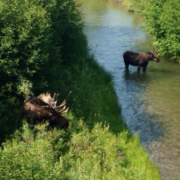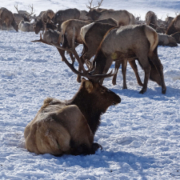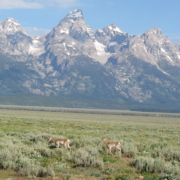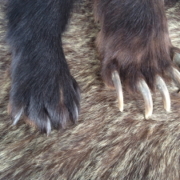Berry Season in the Tetons
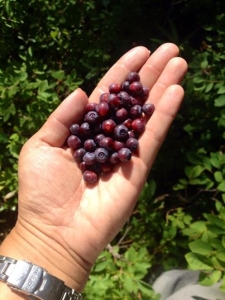 Late summer is berry season in the Tetons. Guests on our Grand Teton National Park tours often ask us – are those berries okay to eat?
Late summer is berry season in the Tetons. Guests on our Grand Teton National Park tours often ask us – are those berries okay to eat?
Many people who visit the Greater Yellowstone Area have seen, or even tried, the many products made with Huckleberries – ice cream, milk shakes, jams and jellies, even hand lotion! Huckleberry season is a long awaited time of year by all who have eaten this heavenly fruit. Huckleberries, sometimes referred to as Mountain Blueberries, are a smaller, sweeter version of a blueberry. Found throughout the Rocky Mountain Region, they are a favorite for canning and smoothies, or just straight off the bush. Good news, the huckleberry season is soon to be upon us! But wait, there’s more. There are even more delicious berries in the Teton Mountains.
Service Berry is a close second to huckleberry. Although possessing a slightly mealy texture, the sweetness and flavor make this berry a go-to for preserves of all kinds. Widely found in this region, the service berry patches are not quite as closely guarded as huckleberry. You may find someone willing to point you in the right direction.
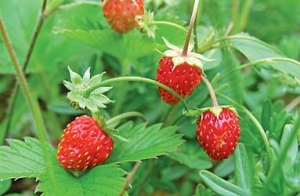
Choke Cherry, despite its ominous name, is quite tasty. As with other cherries, the large pit must be removed, which can be quite a task, but worth the reward. The long strand of fruits makes picking easy and efficient. Combine with Service Berry to make mixed-berry preserves. The elusive Wild Strawberry also grows in this area, but not in large numbers. These tiny strawberries have huge flavor and sweetness, but this fact is not lost on the wildlife. They are quick to grab ripened fruit before anyone else. If found, these are best eaten trail-side since it is unlikely to find any large number for preserves, and who can wait anyway?
 If you do go berry picking this season, keep two things in mind. First, be sure what you are eating are the real deal so that you don’t eat something poisonous! And secondly, keep in mind that this is food for everyone. Not only is it important to be considerate to other berry pickers, but also to wildlife, like bears, who rely on this food source to survive our harsh winters. Practice restraint, and always leave at least twice as much as you take.
If you do go berry picking this season, keep two things in mind. First, be sure what you are eating are the real deal so that you don’t eat something poisonous! And secondly, keep in mind that this is food for everyone. Not only is it important to be considerate to other berry pickers, but also to wildlife, like bears, who rely on this food source to survive our harsh winters. Practice restraint, and always leave at least twice as much as you take.
Karyn Greenwood, Buffalo Roam Tours Guide


